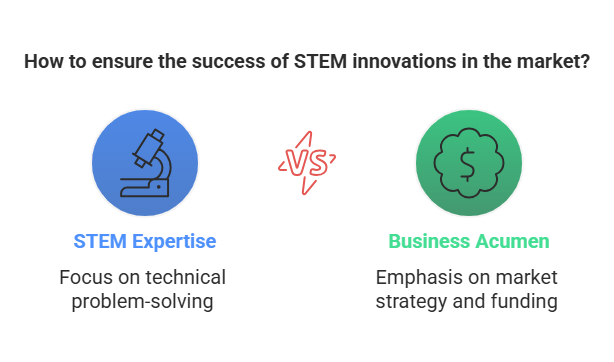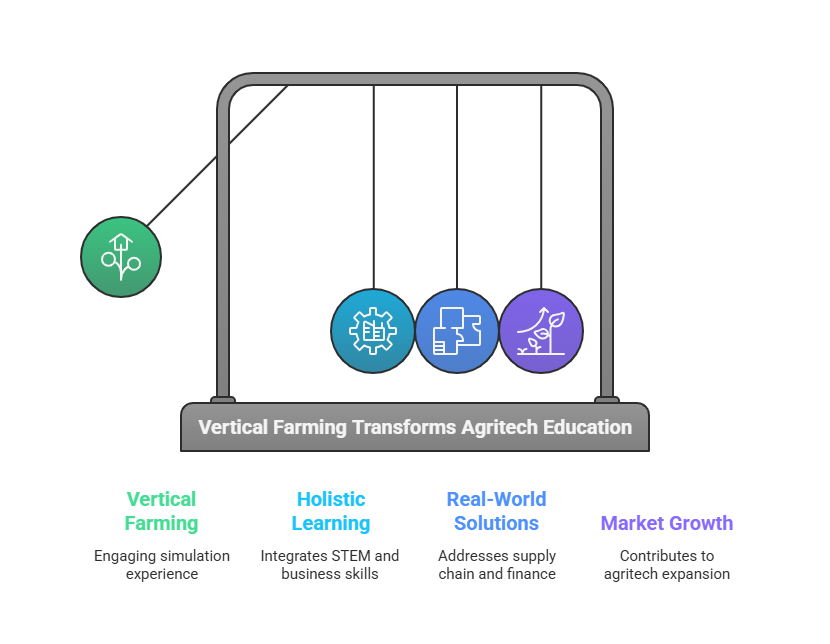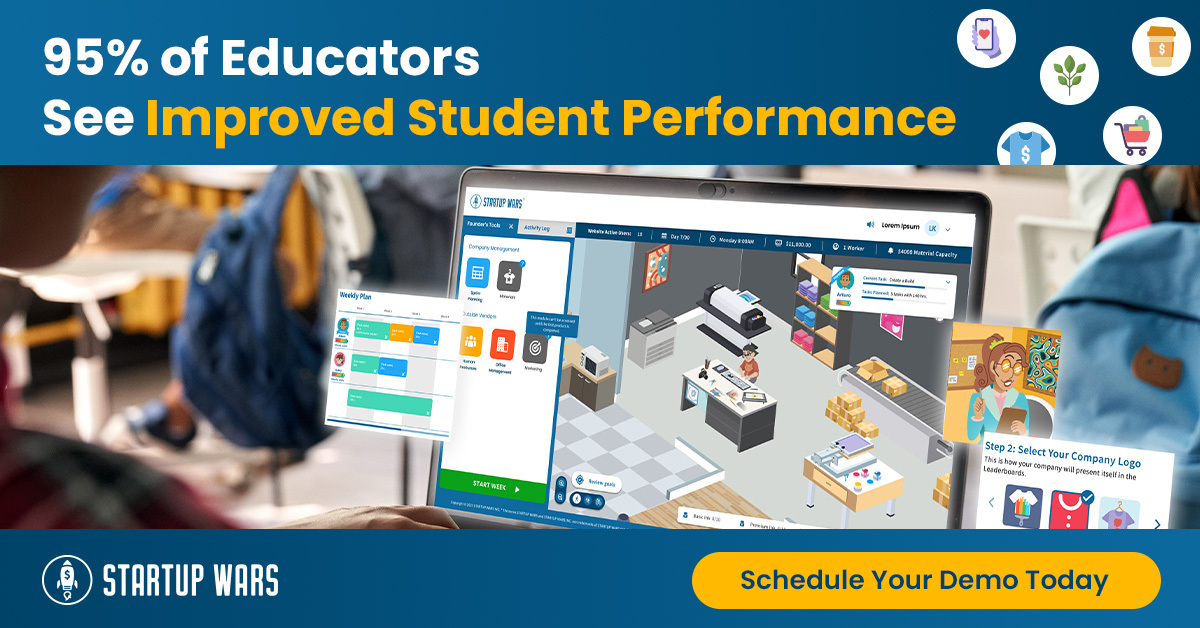Empower STEM students with hands-on business experience through interactive simulation games, preparing them for leadership, innovation, and real-world success.
Table of Contents
Integrating STEM and Business Education Through Simulation-Based Learning
Let’s be honest, today’s job market isn’t just about technical expertise; it’s about who can solve problems, make strategic decisions, and turn ideas into real-world success. The challenge? Most STEM graduates never get the business training they need to take their innovations beyond the lab.
Colleges are recognizing this gap, but what if students could gain real-world business experience before graduating? Is there any way to integrate business education in STEM programs without changing the whole curriculum?
Why STEM Students Need Business Education & Critical Thinking Skills

STEM students are brilliant at solving problems, but what happens when the problem isn’t technical? Like securing funding, managing a team, or figuring out a business model? That’s where interdisciplinary education changes the game. With experiential learning, they don’t just learn theory; they test, fail, adjust, and grow, just like in real-life scenarios. Whether they’re working on biotech, AI, or launching an agriculture company, blending business skills with STEM programs sets them up for success beyond graduation.
Problem-Solving Beyond Technical Fields
STEM professionals love solving complex problems, but real-world success requires more than technical expertise:
- A biotech researcher develops a breakthrough treatment, but without funding and market strategy, it never reaches hospitals.
- An agricultural scientist designs an innovative vertical farming system, but without supply chain management and financial planning, it never scales beyond a prototype.
- A software engineer creates an AI-driven tool, but without a business model, it stays a side project.

The takeaway? STEM students know how to create solutions, but business challenges determine success.
To thrive in today’s tech-driven industries, STEM graduates need management and business skills: leadership & Decision-Making, Marketing & Sales, Financial Acumen, Operations & Team Management.
Without these skills, even the most promising innovations may never leave the lab.
Using Technology & Data Analysis in Business Decision-Making
Successful businesses rely on data, AI, and automation to optimize efficiency, predict trends, and drive profitability, STEM graduates should too. Startup Wars gives students hands-on experience in business strategy, financial planning, and operations management through simulation games. In the Vertical Farming simulation, students run a high-tech agribusiness, manage budgets, and make data-driven decisions, learning by doing, not just reading.
How Hands-On Learning Gives STEM Graduates a Competitive Edge
Great grades look good on paper, but in today’s job market, experience wins every time. According to NACE’s Job Outlook 2023 Report, more than 60% of employers seek problem-solving skills when evaluating candidates, and another study shows that 69.6% consider critical thinking essential for success. That’s why hands-on learning is transforming STEM education.

Business Simulation Games as a Solution
Startup Wars lets students run a virtual company, applying business strategy, finance, and marketing in a risk-free, interactive environment. Instead of reading about business, they experience it: budgeting & financial strategy, marketing & sales, operations & risk management.
Startup Wars helps students develop confidence in decision-making, adaptability to business challenges, and stronger critical thinking skills, so they don’t just learn business, they live it.
Want to give your students a competitive edge? Schedule a demo of Startup Wars today! 🚀
How Colleges Can Integrate Business Simulation Games into STEM Programs
Memorizing business concepts won’t prepare STEM students for real-life success. Just like pilots need flight time, future innovators need hands-on learning to build business acumen. That’s where Startup Wars comes in, immersing students in applied business scenarios without financial risk.
Embedding Business Simulations Games into STEM Curricula
Let’s be real, STEM grads need more than just technical know-how. Today’s industries want engineers who get finance, scientists who think like entrepreneurs, and that’s where Startup Wars stands out. Instead of just reading about business, students run virtual startups, manage budgets, and make everyday decisions in a risk-free, hands-on environment. These interdisciplinary studies build problem-solving, leadership, and financial skills, giving STEM students a serious edge in today’s job market.
Incorporating Vertical Farming as a Simulation Game: lessons
One of Startup Wars’ most innovative simulation games is Vertical Farming, where students manage a sustainable agriculture company while applying business skills and STEM principles.
Why Vertical Farming?
✔ The global agritech market was valued at $23.5 billion in 2022 and is projected to reach $79.7 billion by 2030, according to a report.
✔ It blends engineering, finance, and marketing, giving students a holistic STEM-business experience.
✔ Students solve real-world business challenges, from supply chain issues to financial forecasting.

What Students Learn in the SUW Vertical Farming Simulation:
✔ How to optimize equipment & inventory management
✔ HR & workload management for scaling operations
✔ Financial reporting & strategic planning for profitability
✔ Marketing & brand positioning to capture consumer demand

With Startup Wars, STEM students don’t just learn about agribusiness, they run one. And when they graduate, they’ll have real business skills and experience to showcase on their resumes.
The Future of STEM & Business Education: Hands-On Learning with Startup Wars
Technical skills alone won’t cut it anymore. STEM graduates need business skills, and hands-on learning experience to turn ideas into success. Startup Wars bridges this gap through immersive, risk-free business simulations games, letting students apply strategy, finance, and decision-making in real time.
To actually run a high-tech agriculture company, STEM students need business skills.
Want to future-proof STEM career pathways?
Frequently Asked Questions
1. Why is business education important for STEM students?
2. How does Startup Wars enhance hands-on learning in STEM programs?
3. Can Startup Wars be integrated into existing STEM courses?
4. What is the Vertical Farming simulation, and how does it benefit students?
5. How can my university implement Startup Wars in its curriculum?
Bridge the Gap Between STEM and Business: Try Startup Wars' Vertical Farming experience
Sources
- Florida International University (FIU) – The Rise of Interdisciplinary Roles: STEM and Business in the Job Market. https://business.fiu.edu/academics/graduate/insights/posts/the-rise-of-interdisciplinary-roles-stem-and-business-in-the-job-market.html
- Coys Camps and Classes – STEM Entrepreneurship: The Synergy Between STEM Education and Business. https://coyscampsandclasses.net/blog/stem-entrepreneurship-the-synergy-between-stem-education-and-business
- VentureLab – STEM Education and Entrepreneurship: Turning Visionary Ideas into Tangible Realities. https://venturelab.org/stem-education/#:~:text=Students%20are%20encouraged%20to%20identify,visionary%20ideas%20into%20tangible%20realities
- The Financial Express – Redefining Business Education Through STEM Integration. https://today.thefinancialexpress.com.bd/30th-anniversary-issue-3/redefining-business-education-through-stem-integration-1702110474
- Filament Games – Research Roundup: Game-Based Learning and STEM Education. https://www.filamentgames.com/blog/research-roundup-game-based-learning-and-stem-education/
People Also Searched For:
-
Key Finance and Accounting Concepts Students Learn From Startup Wars
-
How Startup Wars Uses The Main Principles Of Lean Canvas Methodology
-
Financial Management and What Students Can Learn From A Startup Simulation Game
-
Tips To Be Successful In A Startup Simulation
-
How Startup Wars Allows Students To Make Critical Business Decisions






